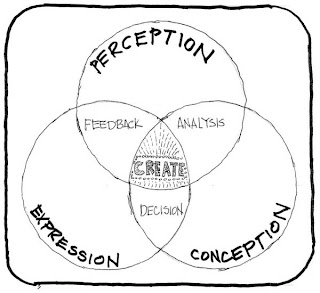 |
| Photo Source |
"You must be the change you want to see in the world...Every moment of your life is infinitely creative and the universe is endlessly bountiful. Just put forth a clear enough request and everything your heart desires must come to you."
- Mahatma Gandhi
Creativity is a topic that I have written on before. Writing daily I wonder where it is coming from? Why can I write multiple post and in two books when others struggle to squeeze out a status update on Facebook? Some see it as a spiritual gift or connection, maybe not those Facebook status updates...more of my friends need to learn basic grammar rules...I'm just saying.
When you are in the middle of creating and you get the feeling of 'flow' ideas are pouring through you, it does feel spiritual and elusive. Like that puff of fog that could evaporate at any second. But what if we could connect to the flow anytime we wanted to? The science of creativity is something that I can't stop looking at and understand.
First, what is creativity?
Going with Webster's definition, it is to bring into existence. How is it that we bring our thoughts, stories or reflections into existence on a regular basis?
Searching I found an article 'How the Creative Process Works,' posted on the Ludwig Von Mises Institute page. Robert Lindsay Nathan's article was posted as a caveat looking at 'intellectual property' laws but beyond the legal application it does shed true insight. Nathan noted that all arts are cyclical. There is a solution, feedback and then the cycle begins again. This does make me feel better about being on the 5th revision of my book.
In the article he mentions Arthur Koestler, who wrote The Art of Creation, who sees creation as the merging of two unrelated processes or ideas. This strikes a cord with me having just read Donald Masses book, Writing the Breakout Novel, where he says on multiple occasions that interesting books come from risk and putting things together that would not seem to fit. It is when two unrelated items come together that processes have to be developed and explained and the creation sparks. It is that surprise to see the connections and how the things fit that pulls in the reader.
The Creation Process
 |
| Photo Source |
- The creative process begins with the initial free flow of ideas. For writers that is free writing or rough drafting letting all pour out of you with out giving it rules or laws to follow. It is the sparks of free association that come with a burst then dwindle to a sputter.
- Discovery phase. It is the learning that we start at birth taking our world and environment in everyday of life. It is the reading and the searching and talking that we do that lay the foundation for future inspiration.
- Perceptive assimilation. When the experiences of life collide with the a situation that requires a solution. It is in this phase that we see the and feel the flow of creation. Darald Schultz on his blog Creative Latitude, said that this step of the process requires five components: time, information, analysis, concept development and execution.
 |
| photo source |
- Time allows for perfection through revision. It is sad that this is the step of the process that goes first. I find that on those long drives home in bumper to bumper traffic when I have nothing else to do it is when I solve the greatest problems with my book.
- Information is the combination of what you have discovered on the topic and the lifetime of experiences that you have lived.
- Analysis is when you look at the information and research and make your beginning observations. Pointing out patterns and finding connections. Schultz points out that bulk is better then quality. I think that I agree. For writers this would be you have the outline in front of you with some idea of base line plot and then you start the layers of how all the smaller stories fit together. You toss out a ton of ideas and possibilities and then stick with those that are most intriguing and will move your story along.
- Concept development, another way to say rough drafting. It is the putting it all down. Writing the bare bones of how you think the initial bits feel and fit together. This starts as an ugly collage of what it will look like in the end but the process has to start and to fix you have to have something to start with.
- Execution is the wrapping up. The final polish on the draft making sure all the characters have the same name throughout, that their story all has an end. It is making sure the tone is correct and seeing it as a reader will.

love this! -found u on seeded buzz
ReplyDelete